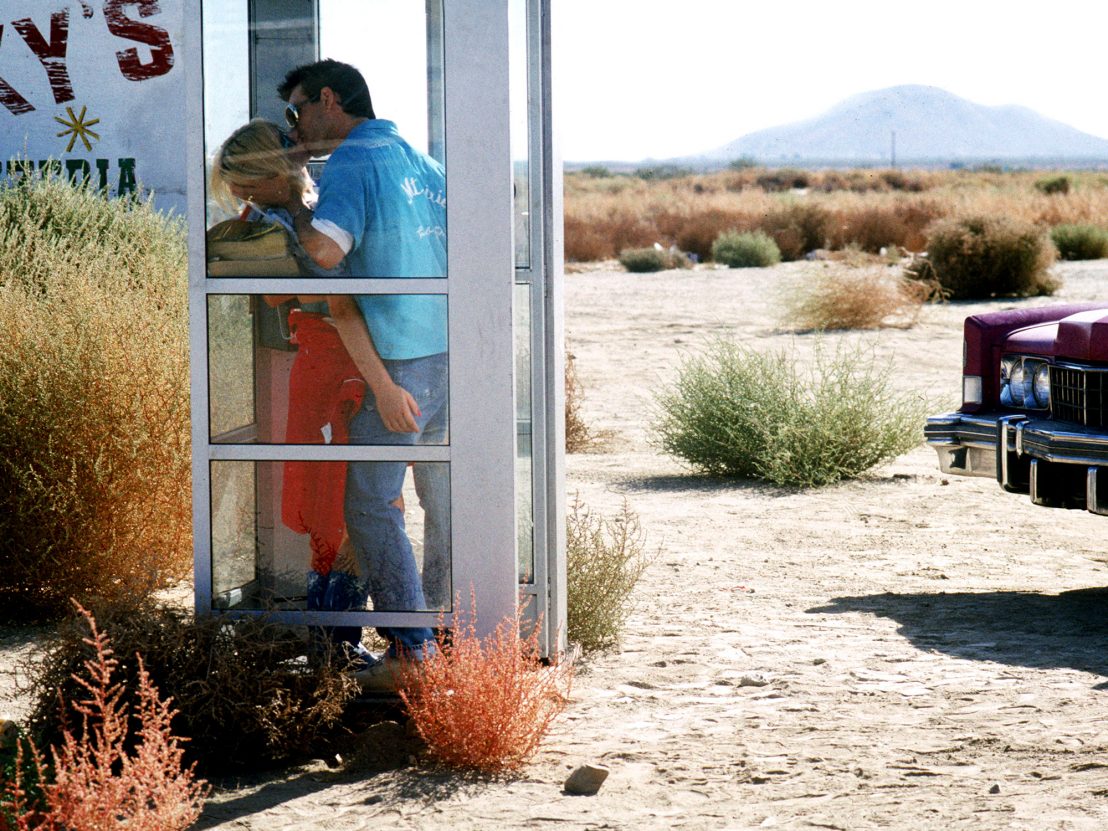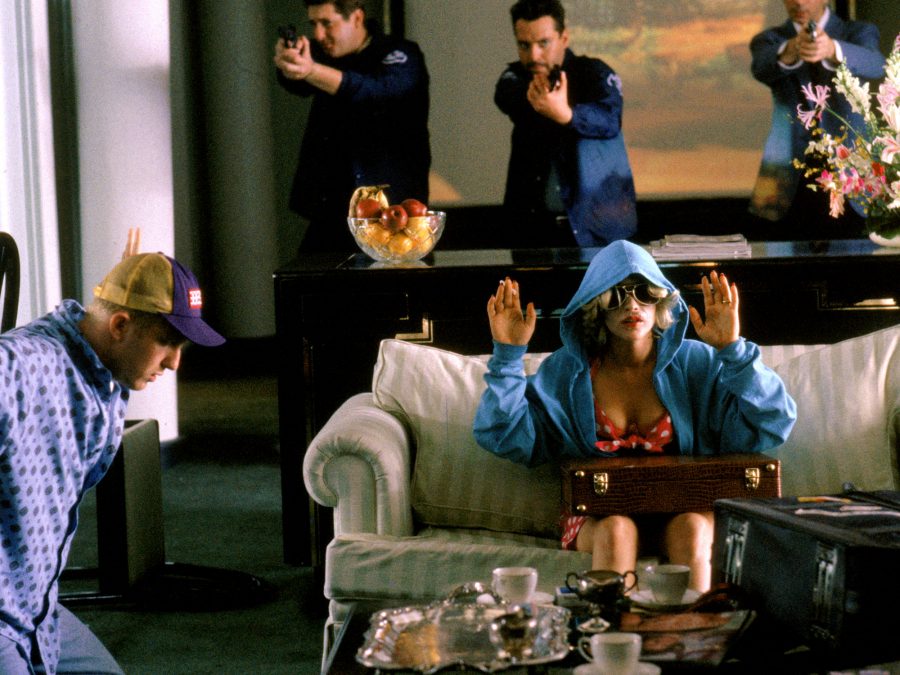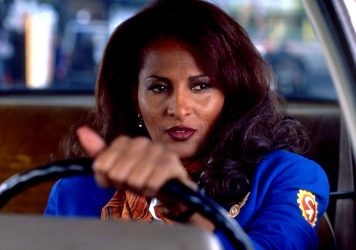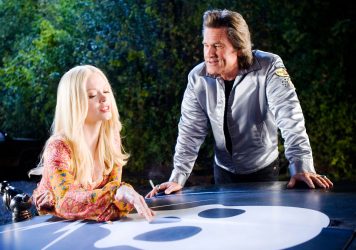
Every romance has its meet-cute. In the case of Clarence Worley (Christian Slater) and Alabama Whitman (Patricia Arquette), this takes place in a Detroit movie theatre, announcing to the viewer that Tony Scott’s True Romance is to be a hall of mirrors.
This movie house, showing a decidedly unromantic triple feature of Shin’ichi ‘Sonny’ Chiba karate films from 1974 (The Street Fighter, Return of the Street Fighter, Sister Street Fighter), is not just a meeting-place of soulmates but a melting pot of genres in a film which features romance as advertised but blurs it with gun-toting action, mafia machinations, Hollywood satire, stoner comedy and police procedural.
Comic book store worker Clarence is a rockabilly freak and movie geek, who in the absence of his estranged father Clifford (Dennis Hopper), looks to men from the movies instead as his mentors and role models. True Romance opens with Clarence singing the praises of Elvis in Richard Thorpe’s Jailhouse Rock and every so often the ghost of Elvis (Val Kilmer) shows up to give Clarence guidance. Chiba too is idolised for being the “bad motherfucker” that Clarence would like to be himself. Clarence is a lost boy in search of identity, and meeting Alabama sets him on a course to live out the movie scenarios of which he has always fantasised.
Make no mistake, True Romance is not just a self-conscious movie fantasy, but a very male one. Here Alabama is reduced to the role of whore with a heart of gold, or doting wife who lives to serve Clarence’s every whim, or sideline cheerleader about how ‘cool’ Clarence is. In fact, she belongs to a chorus of similar sideline cheerleaders, in a film where everybody seems to love Clarence (“I like this guy”, keep saying Chris Penn and Tom Sizemore’s cops, who have Clarence under surveillance).
When Clarence decides to go all Taxi Driver, even wearing a jacket similar to Travis Bickle’s as he guns down Alabama’s pimp Drexl Spivey (Gary Oldman), Alabama improbably sees this psychotic act (instigated by the Elvis in Clarence’s head) as a romantic gesture. Discovering that the suitcase Clarence picked up from Drexl’s place was filled with bags of cocaine rather than Alabama’s belongings, the two go on the run together. It is a reprise of Terrence Malick’s Badlands, directly evoked by Alabama’s dreamy voiceover and Hans Zimmer’s xylophone score.
Inevitably this couple’s imitations of cinema will lead them to Hollywood, where they hang out with Clarence’s old friend – and aspiring actor – Dick Ritchie (Michael Rapaport) and his reefer-mad roomie Floyd (Brad Pitt), looking to sell on the narcotics. Here, in the City of Dreams, a number of different subplots converge into an explosive finale, as Clarence and Alabama find themselves in a California suite dealing with real cops, real gangland killers (including James Gandolfini as a murderous thug with a melancholic side) and a film producer (Saul Rubinek) who specialises in on-screen violence.
This is the realm of meta-cinema, where those who make movies, those who long to be in them and those who model their behaviour on them all come together to contrive between them a classic movie climax: a shoot-out in which incongruous parties aggressively face off to see who is left standing in the end.

Entirely unsurprisingly, True Romance was scripted by Quentin Tarantino. It is part of his juvenilia, drawn in part from his amateur debut feature My Best Friend’s Birthday released in 1987, and in part from the much larger screenplay The Open Road which Tarantino co-wrote with his friend Roger Avary in 1988, eventually splitting into two separate titles: Natural Born Killers and True Romance.
Yet for a film coming right from the very beginning of his career, this is still unmistakably a Tarantino joint, showing many of the hallmarks from his future work: a preoccupation with B-movie tropes from cinema’s popular margins; an obsession with junk food and takeaway; and a self-aware focus on cinema as a medium for wish fulfilment, where romantic ideals trump any truth.
At its centre, Clarence is perhaps the character who most closely embodies Tarantino’s own identity and aspiration. He’s a fast-talking movie nerd who rises from a job in pop-culture retail to the heights of Hollywood, while realising the cinematic dream of getting the girl, beating the bad guys, taking the money and living the dream in paradise.
You might also see something of Tarantino in the person of Drexl, a dreadlock-sporting, scarred white man who imagines himself to be black, grotesquely caricaturing African-American speech patterns and postures (which is something that, notoriously, Tarantino’s screenplays also do). It’s up to the viewer to determine whether such ethnic impersonation is simply beyond, so to speak, the pale, or whether there is something more sophisticated and self-consciously reflexive going on with this provocative material, in a film where everyone is inauthentic and role plays in accordance with the paradigms of cinema’s pulp fictions.
In any case, as a procurer, thief and cold-blooded killer, Drexl is guilty of far worse than mere cultural appropriation. Issues of race are also complicated in what is perhaps the film’s best scene, where Clifford goads Sicilian mob consigliere Vincenzo Coccotti (Christopher Walken) into killing him before he can reveal Clarence’s whereabouts. Clifford achieves this by telling Vincenzo an extremely racist story about the historical miscegenation of Italian Sicilians and Moors. The anecdote is offensive, but it is also designed precisely to offend, and once Clifford’s motives are taken into account this story’s very racism is what ennobles its self-sacrificing teller.
Originally, B-maestro William Lustig was attached to direct True Romance, but eventually Scott took over, packaging the film’s violent grindhouse motifs into a very slick package. One year later, cameoing in Rory Kelly’s Sleep With Me, Tarantino paid homage to Scott with a memorable speech (which he wrote) that zeroes in on the homosocial elements of Scott’s Top Gun, reinterpreting the supposedly jingoistic film as a subversion of American heteronormativity.
Tarantino’s next feature, Pulp Fiction, won the Palme d’Or, turning the writer/director into a superstar and influencing a decade of independent cinema with its criss-crossing narratives and postmodern style. Pulp Fiction is certainly the richer, more complex film, but True Romance nonetheless has much in common with it, and feels like a dry run, right down to the genre-fixing title. Tarantino’s special brand of cinephilia may eventually have grown and matured, but True Romance is where the sparks first flew.
True Romance is available on UHD and Blu-ray via Arrow from 19 July.
Published 19 Jul 2021

Her role as lovestruck sex worker Alabama is among the most compelling characters of the 1990s.

Accusations that the director’s work is misogynistic for enacting violence against women are wide of the mark.

The director’s own professed black sheep is his most beautiful work.